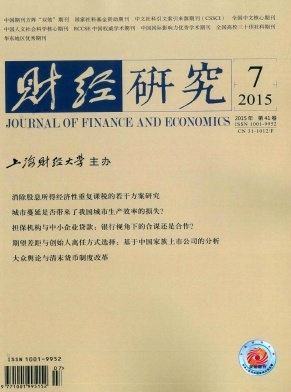转移支付形式会影响地方政府的收支行为吗?——理论研究和经验分析
财经研究 2015 年 第 41 卷第 07 期, 页码:
摘要
参考文献
摘要
财力与事权的不匹配导致了财政垂直不平衡,转移支付成为政府间财政关系的重要内容。文章以税收竞争框架为基础,讨论了在资本自由流动的条件下,不同类型的转移支付对地方政府产生的收支效应。基于中国县级数据的研究发现,大规模的转移支付对地方政府收支行为确实产生了显著影响:支出决策的敏感程度要大于收入决策。对转移支付细分后发现,专项转移支付以及一般性转移支付对地方政府收支决策的影响存在明显差异,前者的支出效应要大于后者;税收返还对地方政府收入和支出行为都存在正向影响。文章为完善省级以下转移支付制度提供了参考。
[1]丁菊红,邓可斌.政府偏好、公共品供给与转型中的财政分权[J].经济研究,2008,(7):78-89.
[2]范子英,张军.中国如何在平衡中牺牲了效率:转移支付的视角[J].世界经济,2010,(11):117-138.
[3]范子英,张军.粘纸效应:对地方政府规模膨胀的一种解释[J].中国工业经济,2010,(12):5-15.
[4]范子英、张军.转移支付、公共品供给与政府规模的膨胀[J].世界经济文汇,2013,(2):1-19.
[5]高培勇.公共财政:概念界说与演变脉络——兼论中国财政改革30年的基本轨迹[J].经济研究,2008,(12):4-16.
[6]郭杰,李涛.中国地方政府间税收竞争研究——基于中国省级面板数据的经验证据[J].管理世界,2009,(11):54-64.
[7]郭庆旺,贾俊雪.地方政府间策略互动行为、财政支出竞争与地区经济增长[J].管理世界,2009,(10):17-27.
[8]李永友,沈玉平.转移支付与地方财政收支决策——基于省级面板数据的实证研究[J].管理世界,2009,(11):41-53.
[9]平新乔,白洁.中国财政分权与地方公共品的供给[J].财贸经济,2006,(2):49-55.
[10]乔宝云,范剑勇,冯兴元.中国的财政分权与小学义务教育[J].中国社会科学,2005,(6):37-46.
[11]沈坤荣,付文林.税收竞争、地区博弈及其增长绩效[J].经济研究,2006,(6):16-26.
[12]王永钦,张晏,章元,等.中国的大国发展道路——论分权式改革的得失[J].经济研究,2007,(1):4-16.
[13]杨龙见,尹恒.中国县级政府税收竞争研究[J].统计研究,2014,(6):42-49.
[14]尹恒,朱虹.县级财政生产性支出偏向研究[J].中国社会科学,2011,(1):88-101.
[15]尹恒,杨龙见.地方财政对本地居民偏好的回应性研究[J].中国社会科学,2014,(5):96-115.
[16]张恒龙,陈宪.政府间转移支付对地方财政努力与财政均等的影响[J].经济科学,2007,(1):15-23.
[17]张军,高远.官员任期、异地交流与经济增长——来自省级经验的证据[J].经济研究,2007,(11):91-103.
[18]张晏,龚六堂.分税制改革、财政分权与中国经济增长[J].经济学(季刊),2005,(1):75-108.
[19]周黎安.中国地方官员的晋升锦标赛模式研究[J].经济研究,2007,(7):36-50.
[20]周黎安,刘冲,厉行.税收努力、征税机构与税收增长之谜[J].经济学(季刊),2011,(1):1-18.
[21]Arellano M, Bond S. Some tests of specification for panel data: Monte Carlo evidence and an application to employment equations[J]. Review of Economic Studies, 1991, 58(2):277-297.
[22]Blundell R, Bond S. Initial conditions and moment restrictions in dynamic panel data models [J]. Journal of Econometrics, 1998, 87(1):115-143.
[23]Bradford D F, Oates W E. The analysis of revenue sharing in a new approach to collective fiscal decisions [J]. The Quarterly Journal of Economics, 1971, 85(3):416-439.
[24]Brandt L,Holz C A. Spatial price differences in China: Estimates and implications [J]. Economic Development and Cultural Change, 2006, 55(1):43-86.
[25]Hines J R, Thaler R H. Anomalies: The Flypaper Effect [J]. The Journal of Economic Perspectives, 1995, 9(4):217-226.
[26]Koethenbuerger M. How do local governments decide on public policy in fiscal federalism? Tax vs.expenditure optimization [J]. Journal of Public Economics, 2011, 95(11-12):1516-1522.
[27]Leith C, Lewis S W. Fiscal sustainability in a New Keynesian model [J]. Journal of Money, Credit and Banking, 2013, 45(8):1477-1516.
[28]Li H, Zhou L. Political turnover and economic performance: The incentive role of personnel control in China [J]. Journal of Public Economics, 2005, 89(9): 1743-1762.
[29]Qian Y, Weingast B. China’s transition to markets: Marketpreserving federalism, Chinese style [J]. Journal of Policy Reform, 1996, 1(2):149-185.
[30]Rodden J,Eskeland G,Litvack. Fisal Decentralization and the challenge of hard budget constraints [M]. MA:MIT Press, 2003.
[31]Rodrik D. Why do more open economies have bigger governments? [J]. Journal of Political Economy, 1998,106(5):997-1032.
[32]Smart M. The incentive effects of grants[A].Boadway R W,Shah A(eds.) Intergovernmental Fiscal Transfers[C]. Washington:Banco Mundial,2007.
[33]Tsui K. Local tax system, intergovernmental transfers and China’s local fiscal disparities [J]. Journal of Comparative Economics, 2005, 33(1):173-196.
[34]Zodrow G R, Mieszkowski P.Pigou,Tibout, property taxation, and the under provision of local public goods [J]. Journal of Urban Economics, 1986,19(3):356-370.
[2]范子英,张军.中国如何在平衡中牺牲了效率:转移支付的视角[J].世界经济,2010,(11):117-138.
[3]范子英,张军.粘纸效应:对地方政府规模膨胀的一种解释[J].中国工业经济,2010,(12):5-15.
[4]范子英、张军.转移支付、公共品供给与政府规模的膨胀[J].世界经济文汇,2013,(2):1-19.
[5]高培勇.公共财政:概念界说与演变脉络——兼论中国财政改革30年的基本轨迹[J].经济研究,2008,(12):4-16.
[6]郭杰,李涛.中国地方政府间税收竞争研究——基于中国省级面板数据的经验证据[J].管理世界,2009,(11):54-64.
[7]郭庆旺,贾俊雪.地方政府间策略互动行为、财政支出竞争与地区经济增长[J].管理世界,2009,(10):17-27.
[8]李永友,沈玉平.转移支付与地方财政收支决策——基于省级面板数据的实证研究[J].管理世界,2009,(11):41-53.
[9]平新乔,白洁.中国财政分权与地方公共品的供给[J].财贸经济,2006,(2):49-55.
[10]乔宝云,范剑勇,冯兴元.中国的财政分权与小学义务教育[J].中国社会科学,2005,(6):37-46.
[11]沈坤荣,付文林.税收竞争、地区博弈及其增长绩效[J].经济研究,2006,(6):16-26.
[12]王永钦,张晏,章元,等.中国的大国发展道路——论分权式改革的得失[J].经济研究,2007,(1):4-16.
[13]杨龙见,尹恒.中国县级政府税收竞争研究[J].统计研究,2014,(6):42-49.
[14]尹恒,朱虹.县级财政生产性支出偏向研究[J].中国社会科学,2011,(1):88-101.
[15]尹恒,杨龙见.地方财政对本地居民偏好的回应性研究[J].中国社会科学,2014,(5):96-115.
[16]张恒龙,陈宪.政府间转移支付对地方财政努力与财政均等的影响[J].经济科学,2007,(1):15-23.
[17]张军,高远.官员任期、异地交流与经济增长——来自省级经验的证据[J].经济研究,2007,(11):91-103.
[18]张晏,龚六堂.分税制改革、财政分权与中国经济增长[J].经济学(季刊),2005,(1):75-108.
[19]周黎安.中国地方官员的晋升锦标赛模式研究[J].经济研究,2007,(7):36-50.
[20]周黎安,刘冲,厉行.税收努力、征税机构与税收增长之谜[J].经济学(季刊),2011,(1):1-18.
[21]Arellano M, Bond S. Some tests of specification for panel data: Monte Carlo evidence and an application to employment equations[J]. Review of Economic Studies, 1991, 58(2):277-297.
[22]Blundell R, Bond S. Initial conditions and moment restrictions in dynamic panel data models [J]. Journal of Econometrics, 1998, 87(1):115-143.
[23]Bradford D F, Oates W E. The analysis of revenue sharing in a new approach to collective fiscal decisions [J]. The Quarterly Journal of Economics, 1971, 85(3):416-439.
[24]Brandt L,Holz C A. Spatial price differences in China: Estimates and implications [J]. Economic Development and Cultural Change, 2006, 55(1):43-86.
[25]Hines J R, Thaler R H. Anomalies: The Flypaper Effect [J]. The Journal of Economic Perspectives, 1995, 9(4):217-226.
[26]Koethenbuerger M. How do local governments decide on public policy in fiscal federalism? Tax vs.expenditure optimization [J]. Journal of Public Economics, 2011, 95(11-12):1516-1522.
[27]Leith C, Lewis S W. Fiscal sustainability in a New Keynesian model [J]. Journal of Money, Credit and Banking, 2013, 45(8):1477-1516.
[28]Li H, Zhou L. Political turnover and economic performance: The incentive role of personnel control in China [J]. Journal of Public Economics, 2005, 89(9): 1743-1762.
[29]Qian Y, Weingast B. China’s transition to markets: Marketpreserving federalism, Chinese style [J]. Journal of Policy Reform, 1996, 1(2):149-185.
[30]Rodden J,Eskeland G,Litvack. Fisal Decentralization and the challenge of hard budget constraints [M]. MA:MIT Press, 2003.
[31]Rodrik D. Why do more open economies have bigger governments? [J]. Journal of Political Economy, 1998,106(5):997-1032.
[32]Smart M. The incentive effects of grants[A].Boadway R W,Shah A(eds.) Intergovernmental Fiscal Transfers[C]. Washington:Banco Mundial,2007.
[33]Tsui K. Local tax system, intergovernmental transfers and China’s local fiscal disparities [J]. Journal of Comparative Economics, 2005, 33(1):173-196.
[34]Zodrow G R, Mieszkowski P.Pigou,Tibout, property taxation, and the under provision of local public goods [J]. Journal of Urban Economics, 1986,19(3):356-370.
引用本文
杨龙见, 徐琰超, 尹 恒. 转移支付形式会影响地方政府的收支行为吗?——理论研究和经验分析[J]. 财经研究, 2015, 41(7): 0.
导出参考文献,格式为:





 8186
8186  4137
4137

